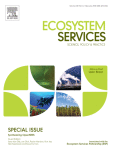Ver ítem
- xmlui.general.dspace_homeCentros Regionales y EEAsCentro Regional Patagonia SurEEA Santa CruzArtículos científicosxmlui.ArtifactBrowser.ItemViewer.trail
- Inicio
- Centros Regionales y EEAs
- Centro Regional Patagonia Sur
- EEA Santa Cruz
- Artículos científicos
- Ver ítem
Stakeholders’ perspectives on the operationalisation of the ecosystem service concept: Results from 27 case studies.
Resumen
The ecosystem service (ES) concept is becoming mainstream in policy and planning, but operational influence on practice is seldom reported. Here, we report the practitioners’ perspectives on the practical implementation of the ES concept in 27 case studies. A standardised anonymous survey (n = 246), was used, focusing on the science-practice interaction process, perceived impact and expected use of the case study assessments. Operationalisation of the
[ver mas...]
The ecosystem service (ES) concept is becoming mainstream in policy and planning, but operational influence on practice is seldom reported. Here, we report the practitioners’ perspectives on the practical implementation of the ES concept in 27 case studies. A standardised anonymous survey (n = 246), was used, focusing on the science-practice interaction process, perceived impact and expected use of the case study assessments. Operationalisation of the concept was shown to achieve a gradual change in practices: 13% of the case studies reported a change in action (e.g. management or policy change), and a further 40% anticipated that a change would result from the work. To a large extent the impact was attributed to a well conducted science-practice interaction process (>70%). The main reported advantages of the concept included: increased concept awareness and communication; enhanced participation and collaboration; production of comprehensive science-based knowledge; and production of spatially referenced knowledge for input to planning (91% indicated they had acquired new knowledge). The limitations were mostly case-specific and centred on methodology, data, and challenges with result implementation. The survey highlighted the crucial role of communication, participation and collaboration across different stakeholders, to implement the ES concept and enhance the democratisation of nature and landscape planning.
[Cerrar]

Autor
Dick, Jan;
Turkelboom, Francis;
Woods, Helen;
Iniesta-Arandia, Irene;
Primmer, Eeva;
Sanna-Riikka, Saarela;
Bezák, Peter;
Mederly, Peter;
Leone, Michael;
Verheyden, Wim;
Kelemen, Eszter;
Hauck, Jennifer;
Andrews, Chris;
Antunes, Paula;
Aszalós, Réka;
Baró, Francesc;
Barton, David N.;
Berry, Pam;
Bugter, Rob.;
Carvalho, Laurence;
Czúcz, Bálint;
Dunford, Rob;
Blanco Garcia, Gemma;
Geama˘na˘, Nicoleta;
Giuca˘, Relu;
Grizzetti, Bruna;
Izakovicˇová, Zita;
Kertész, Miklós;
Kopperoinen, Leena;
Langemeyer, Johannes;
Montenegro Lapola, David;
Liquete, Camino;
Luque, Sandra;
Martinez Pastur, Guillermo José;
Martin-Lopez, Berta;
Mukhopadhyay, Raktima;
Niemela, Jari;
Odee, David;
Peri, Pablo Luis;
Pinho, Patricia;
Gleiciani Bürger, Patrício Roberto;
Preda, Elena;
Priess, Joerg;
Röckmann, Christine;
Santos, Rui;
Silaghi, Diana;
Smith, Ron I.;
Va˘dineanu, Anghelut_a˘;
van der Wal, Jan Tjalling;
Arany, Ildikó;
Badea, Ovidiu;
Bela, Györgyi;
Boros, Emil;
Bucur, Magdalena;
Blumentrath, Stefan;
Carmen, Esther;
Clemente, Pedro;
Fernandes, João;
Ferraz, Diogo;
Fongar, Claudia;
García-Llorente, Marina;
Gómez-Baggethun, Erik;
Gundersen, Vegard;
Haavardsholm, Oscar;
Kalóczkai, Ágnes;
Khalalwe, Thalma;
Kiss, Gabriella;
Köhler, Berit;
Lazányi, Orsolya;
Lellei-Kovács, Eszter;
Lichungu, Rael;
Lindhjem, Henrik;
Magare, Charles;
Mustajoki, Jyri;
Ndege, Charles;
Nowell, Megan;
Nuss Girona, Sergi;
Ochieng, John;
Often, Anders;
Palomo, Ignacio;
Pataki, György;
Reinvang, Rasmus;
Rusch, Graciela Mónica;
Saarikoski, Heli;
Smith, Alison;
Massoni, Emma Soy;
Stange, Erik;
Vågnes Traaholt, Nora;
Vári, Ágnes;
Verweij, Peter;
Suvi, Vikström;
Yli-Pelkonen, Vesa;
Zulian, Grazia;
Fuente
Ecosystem Services 29 Part C : 552-565 (February 2018)
Fecha
2018-02-01
Editorial
Elsevier
ISSN
2212-0416
Formato
pdf
Tipo de documento
artículo
Palabras Claves
Derechos de acceso
Restringido
 Excepto donde se diga explicitamente, este item se publica bajo la siguiente descripción: Creative Commons Attribution-NonCommercial-ShareAlike 2.5 Unported (CC BY-NC-SA 2.5)
Excepto donde se diga explicitamente, este item se publica bajo la siguiente descripción: Creative Commons Attribution-NonCommercial-ShareAlike 2.5 Unported (CC BY-NC-SA 2.5)

